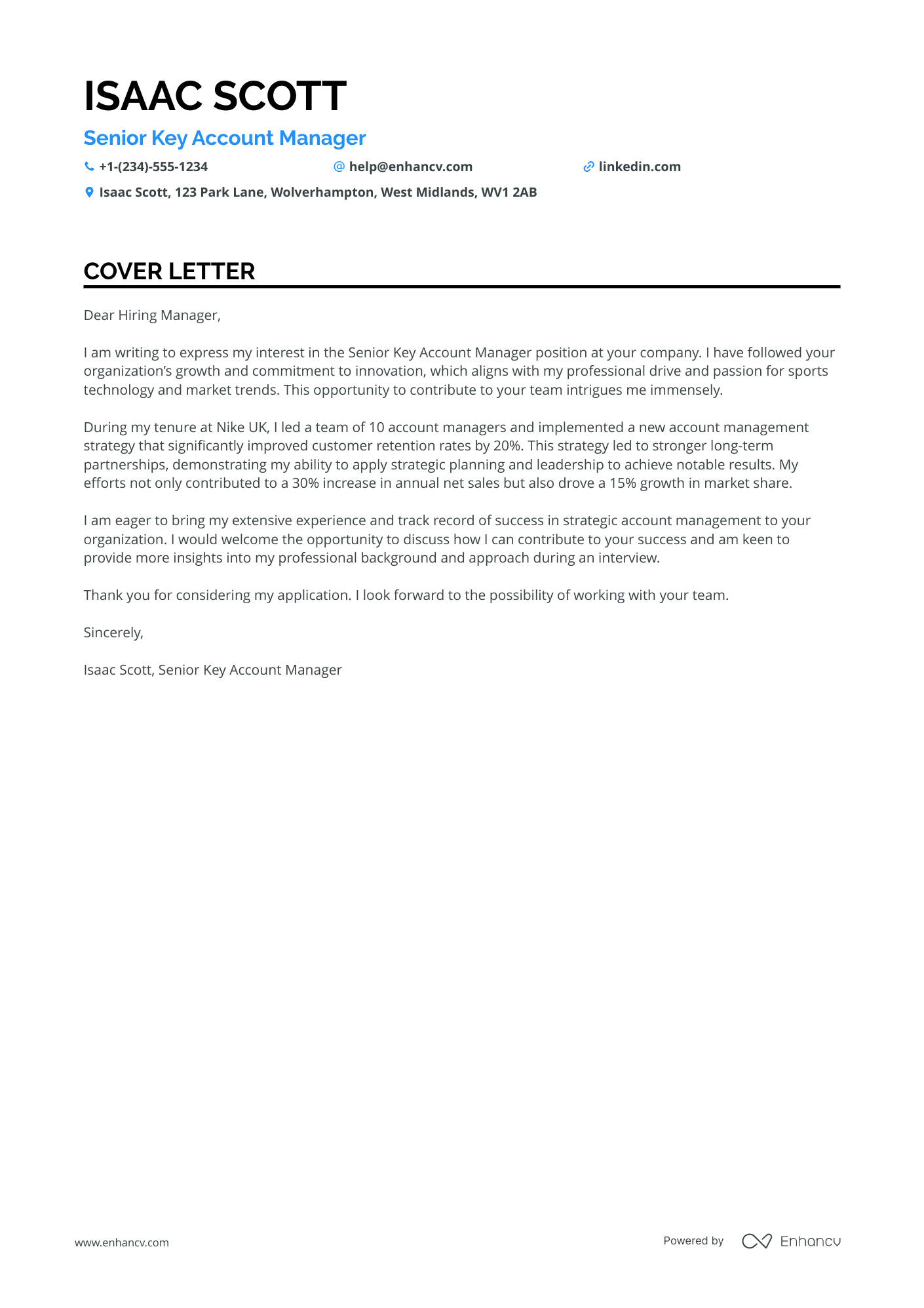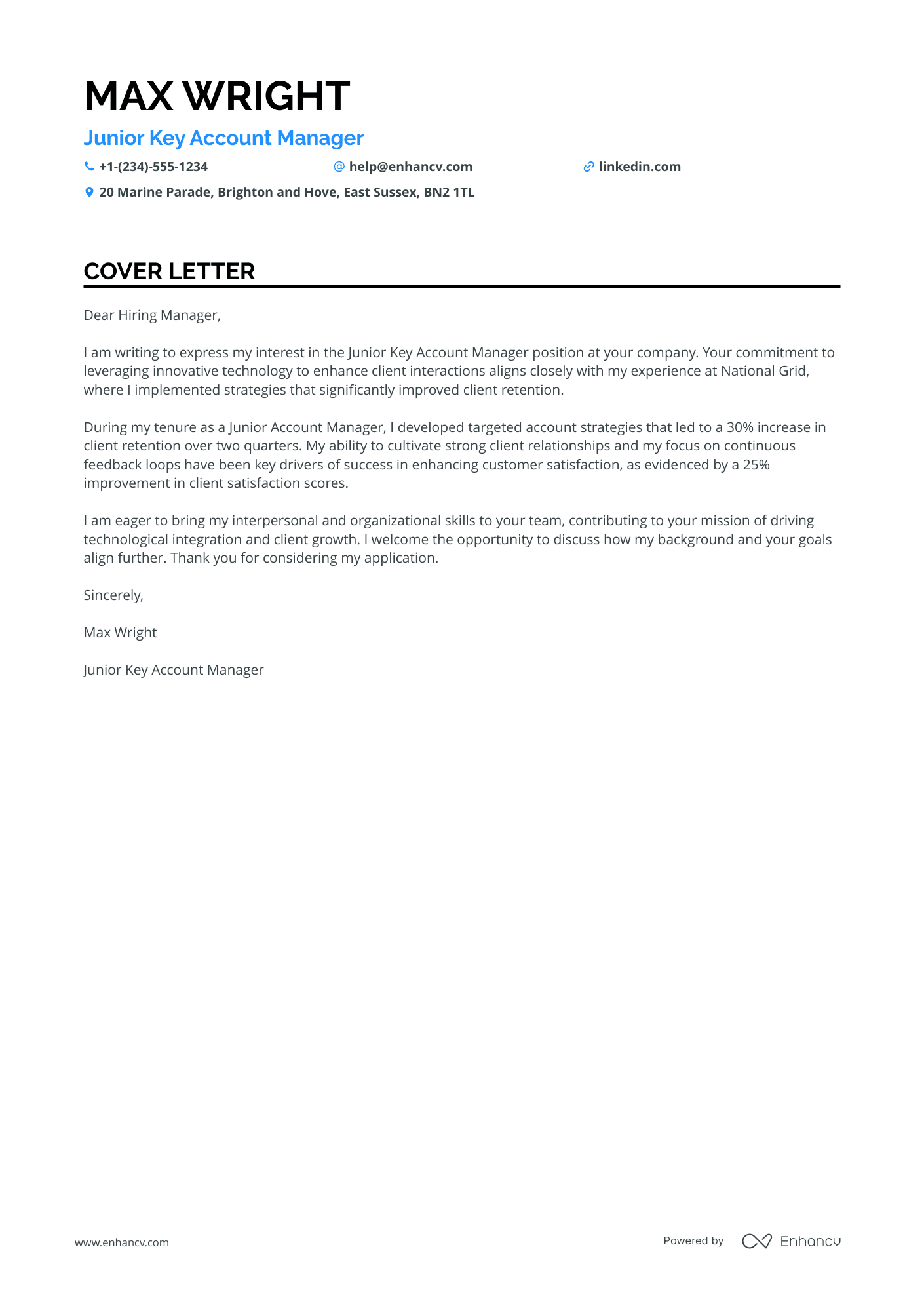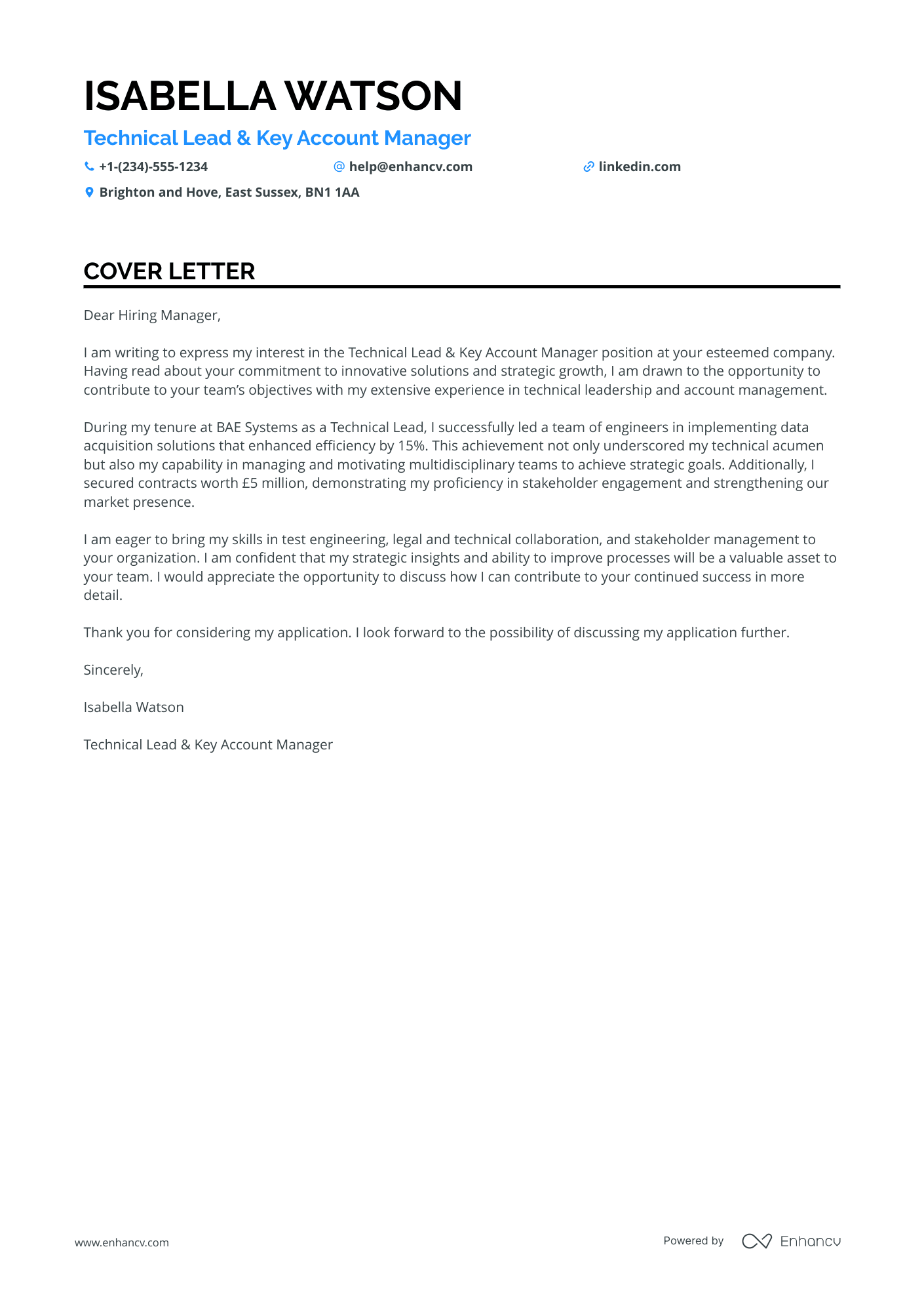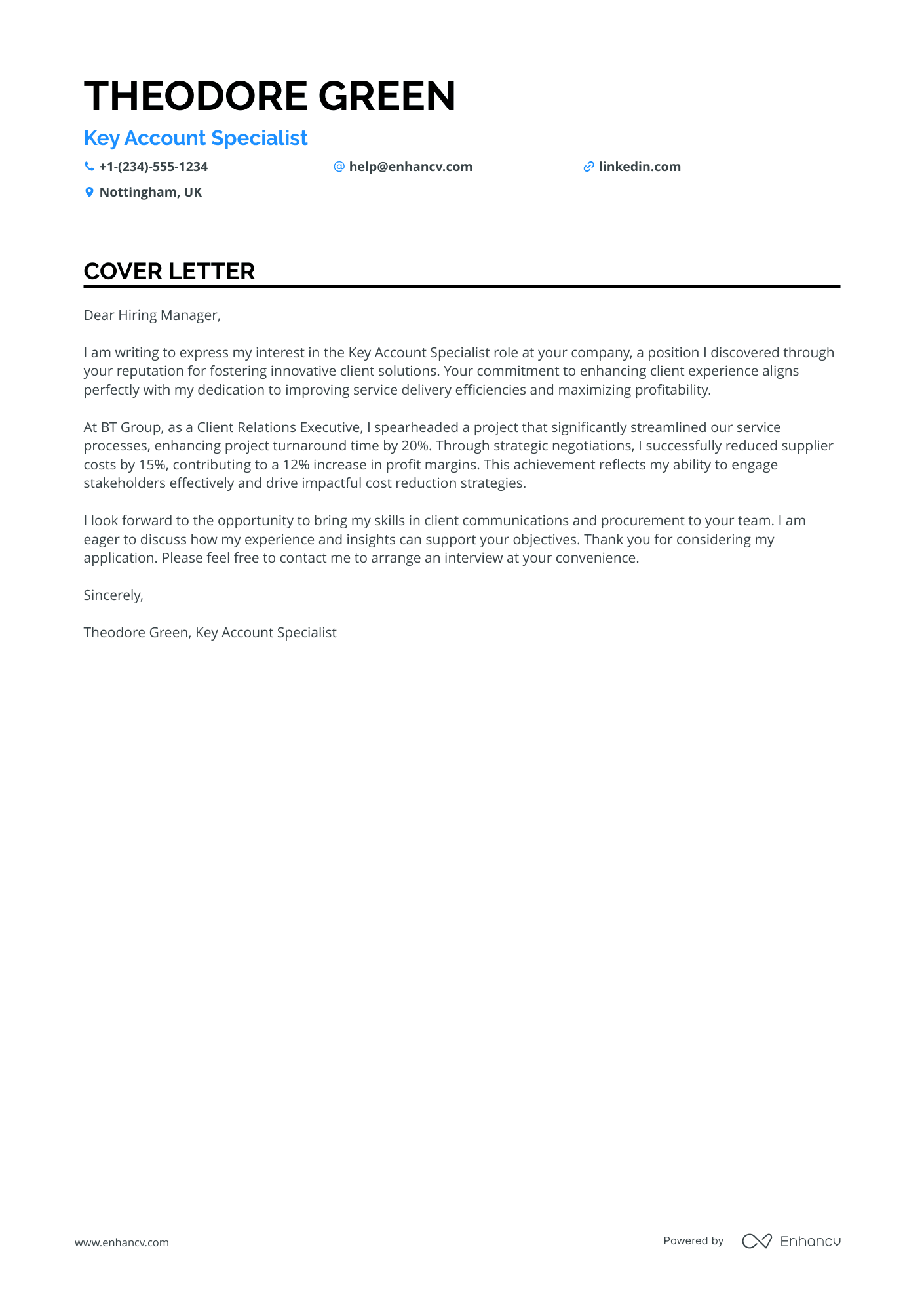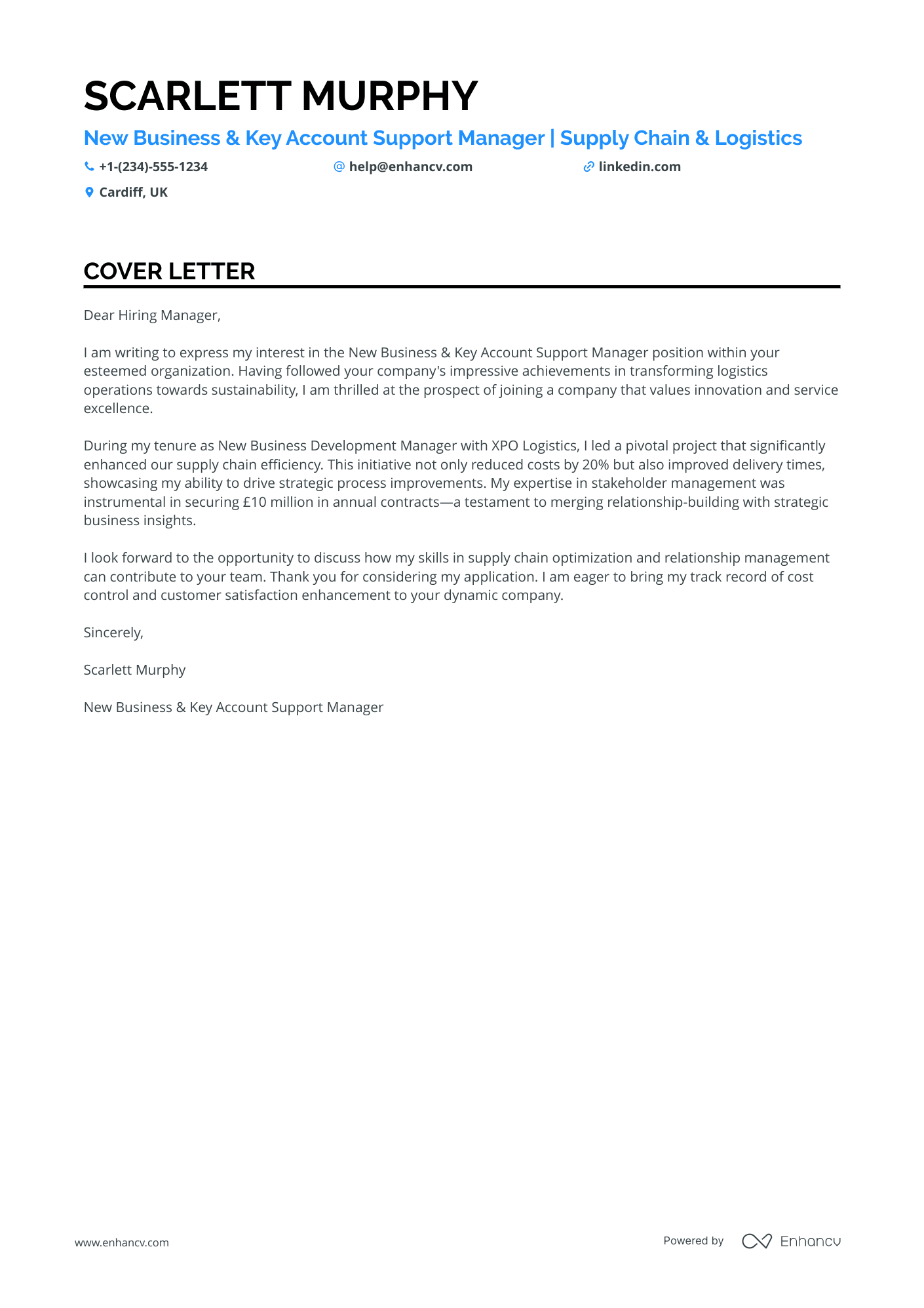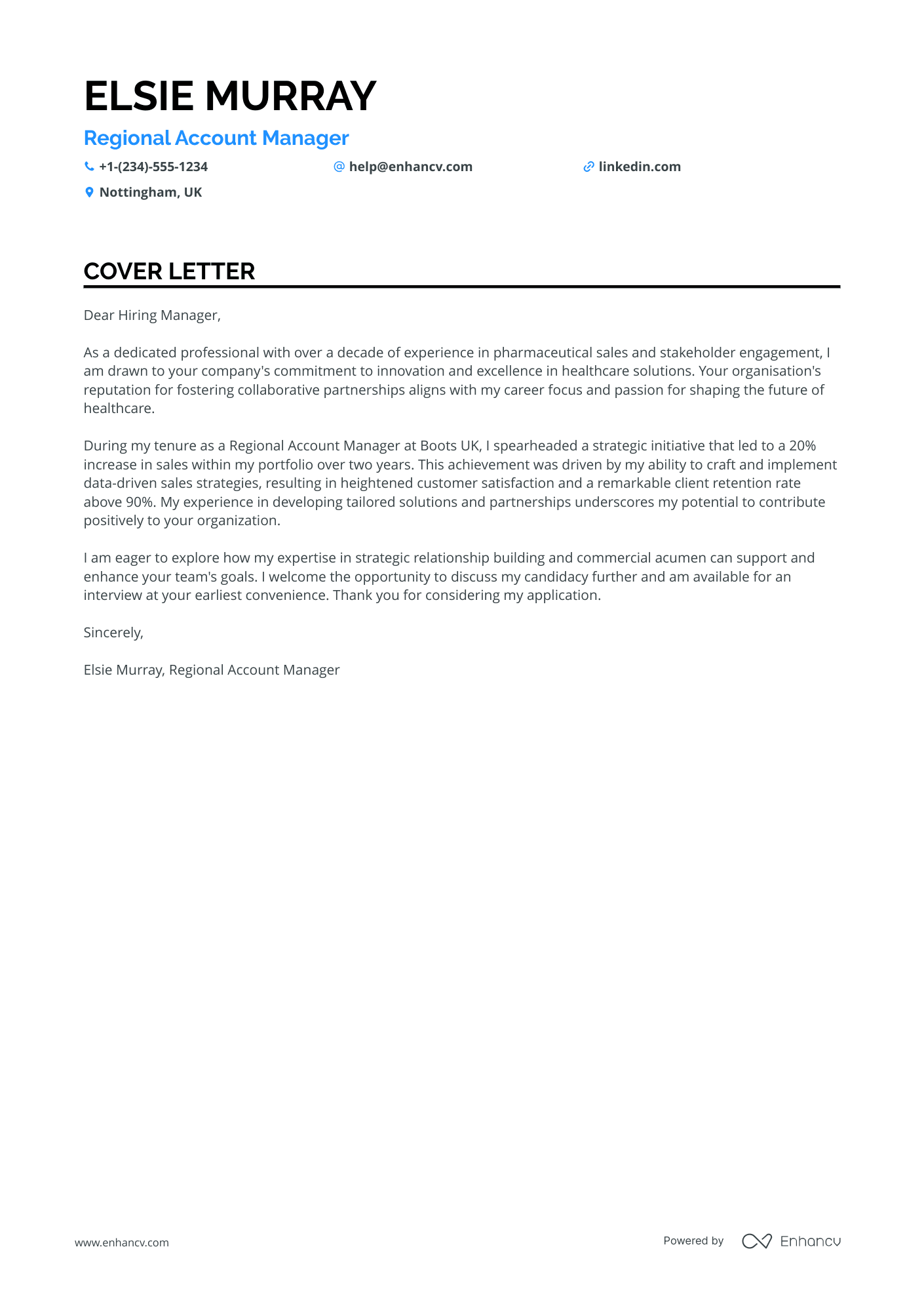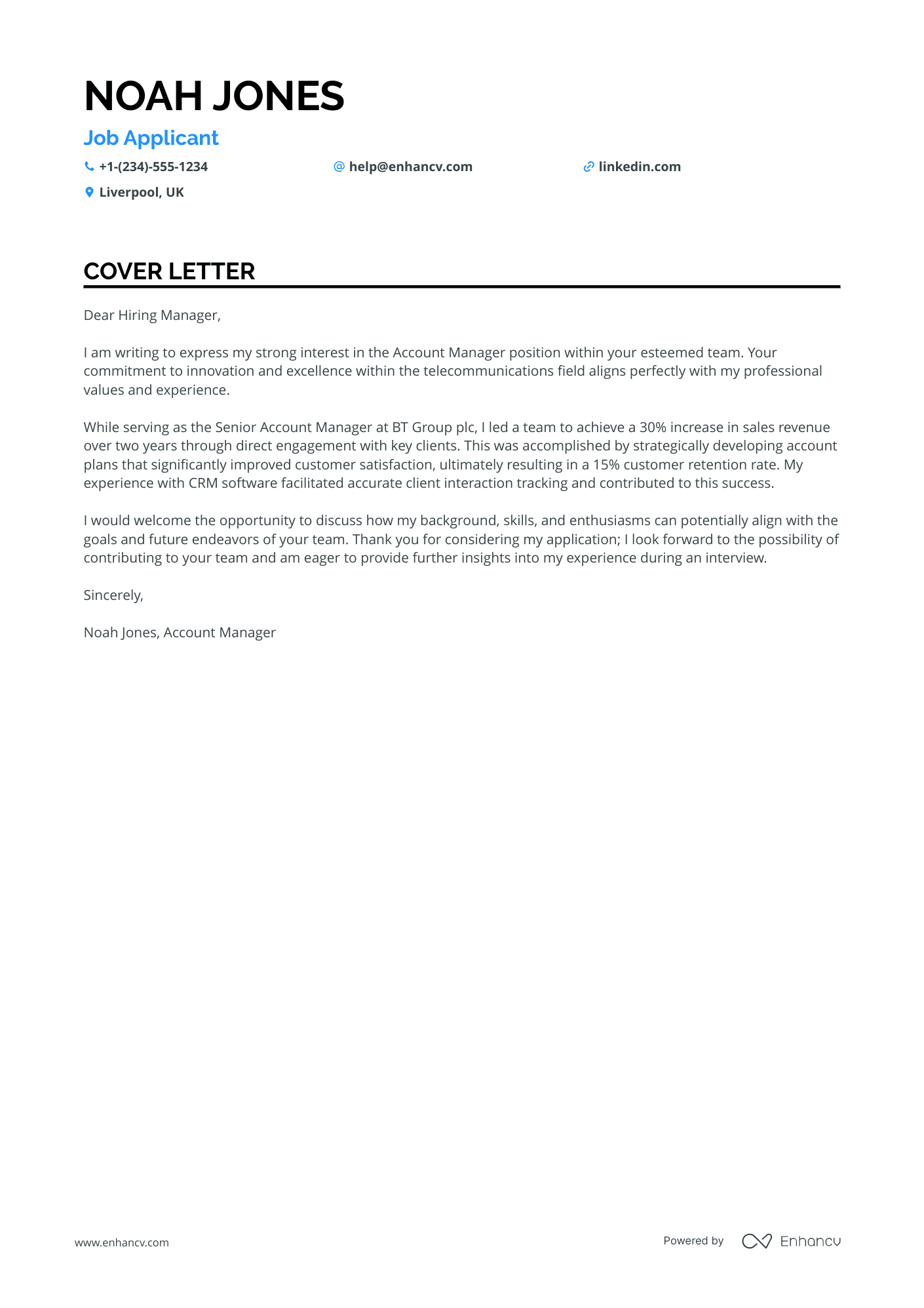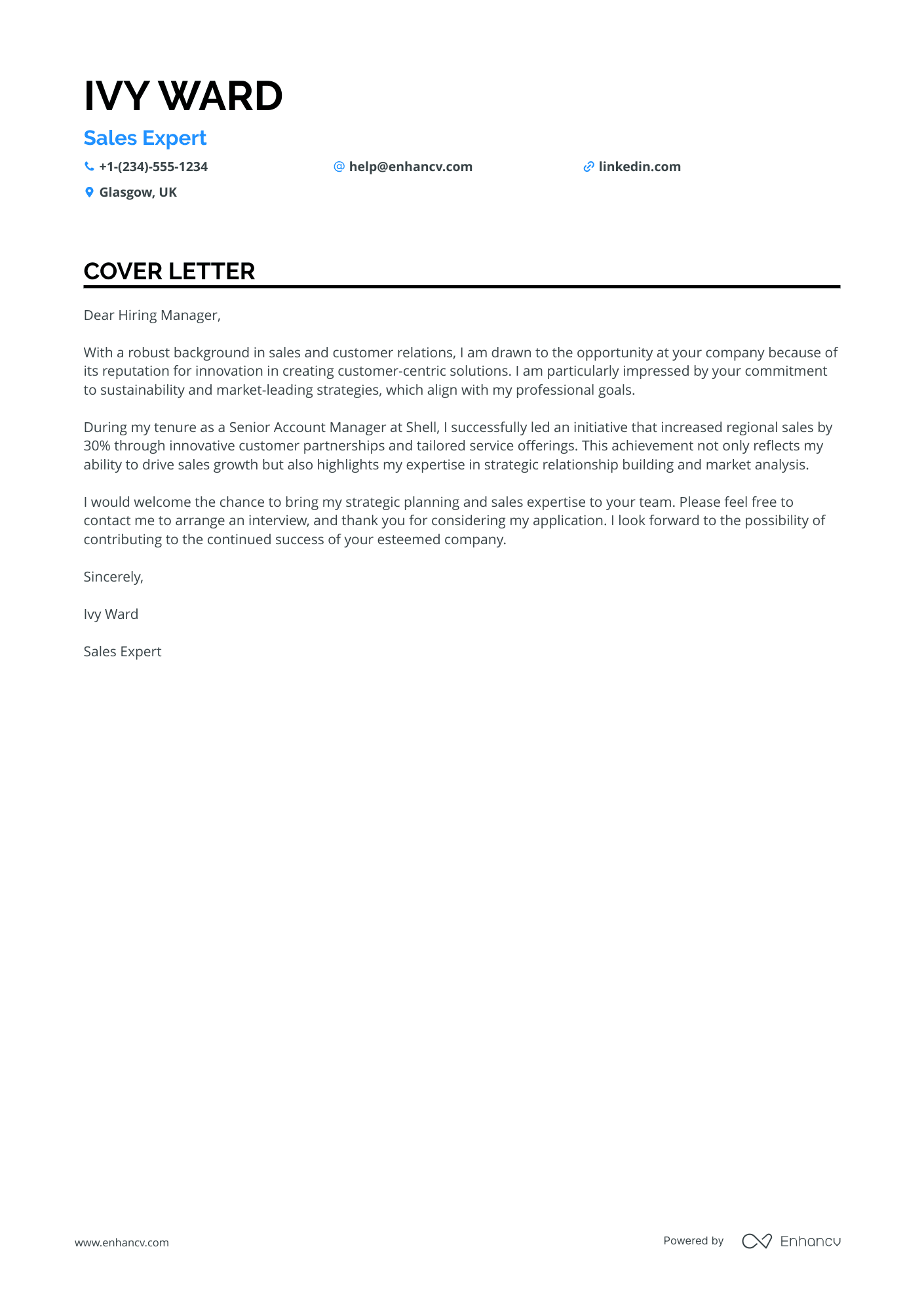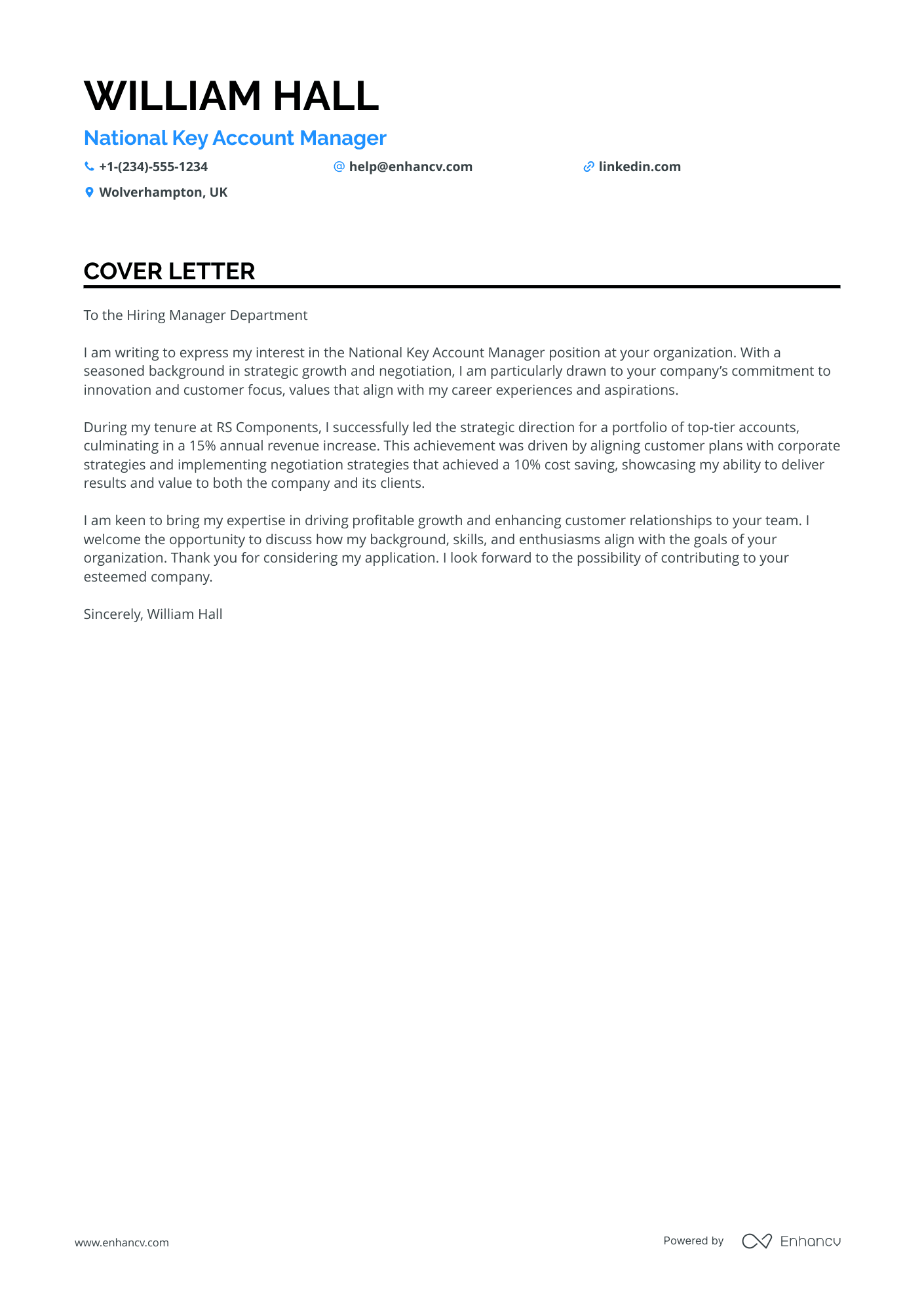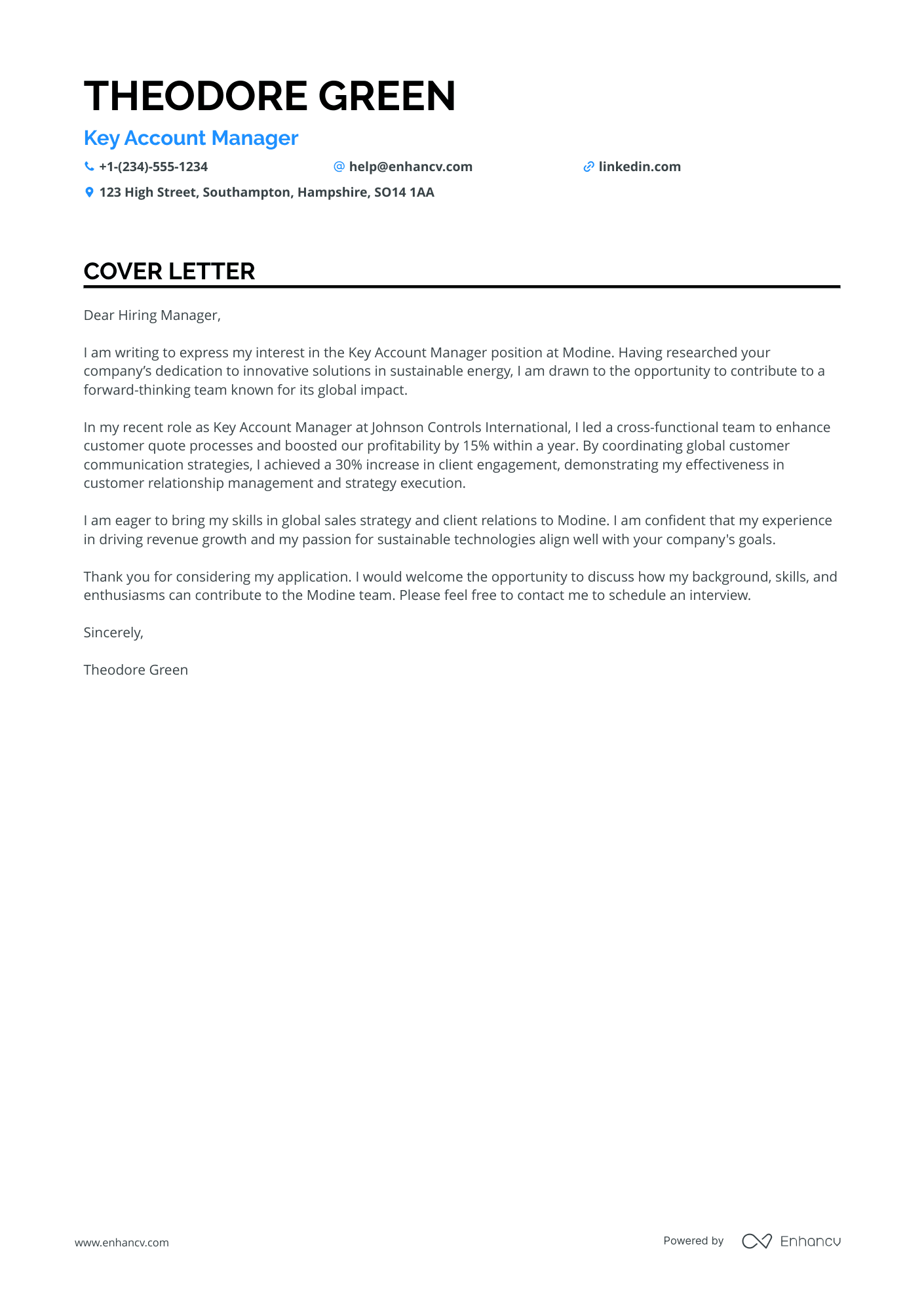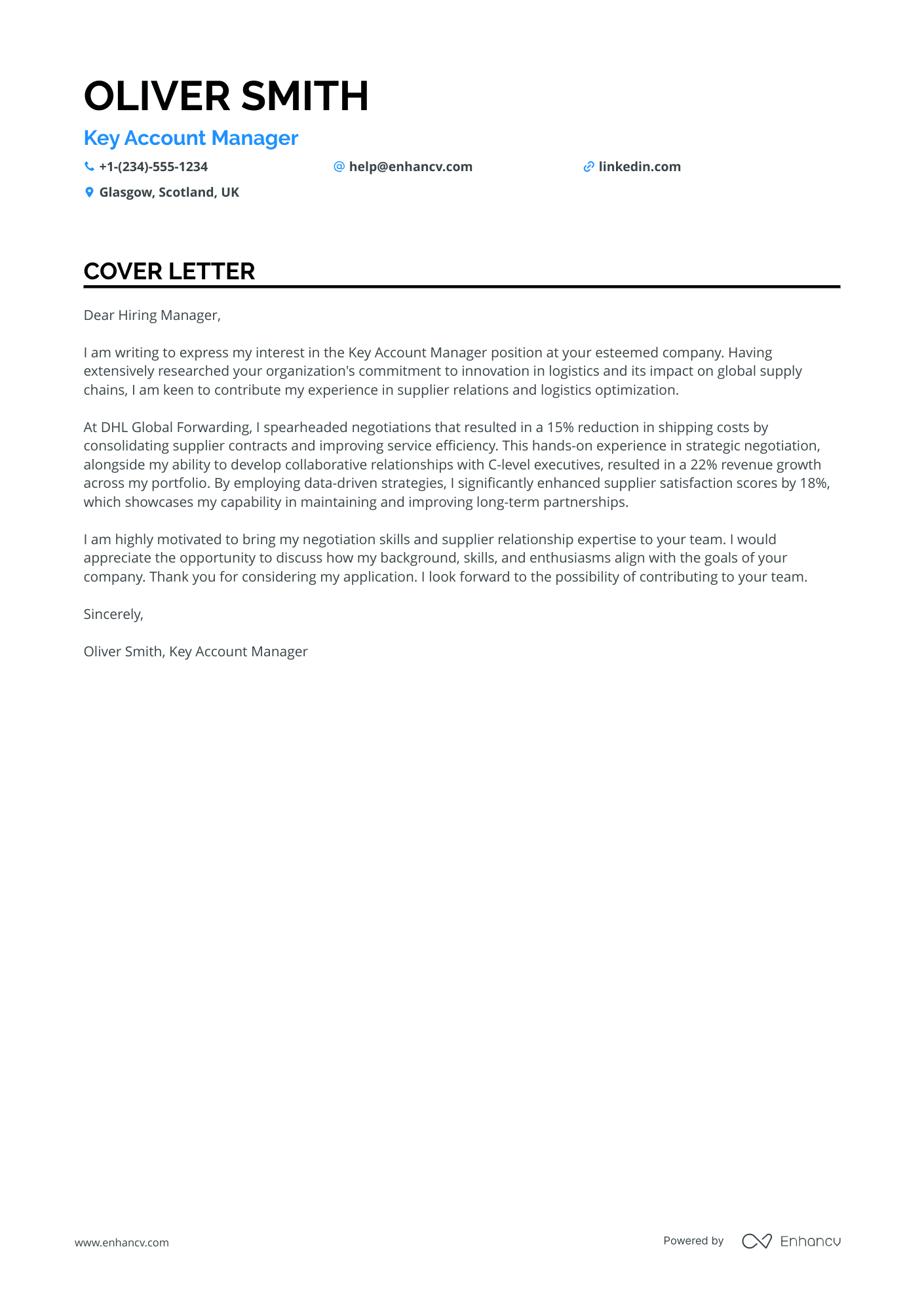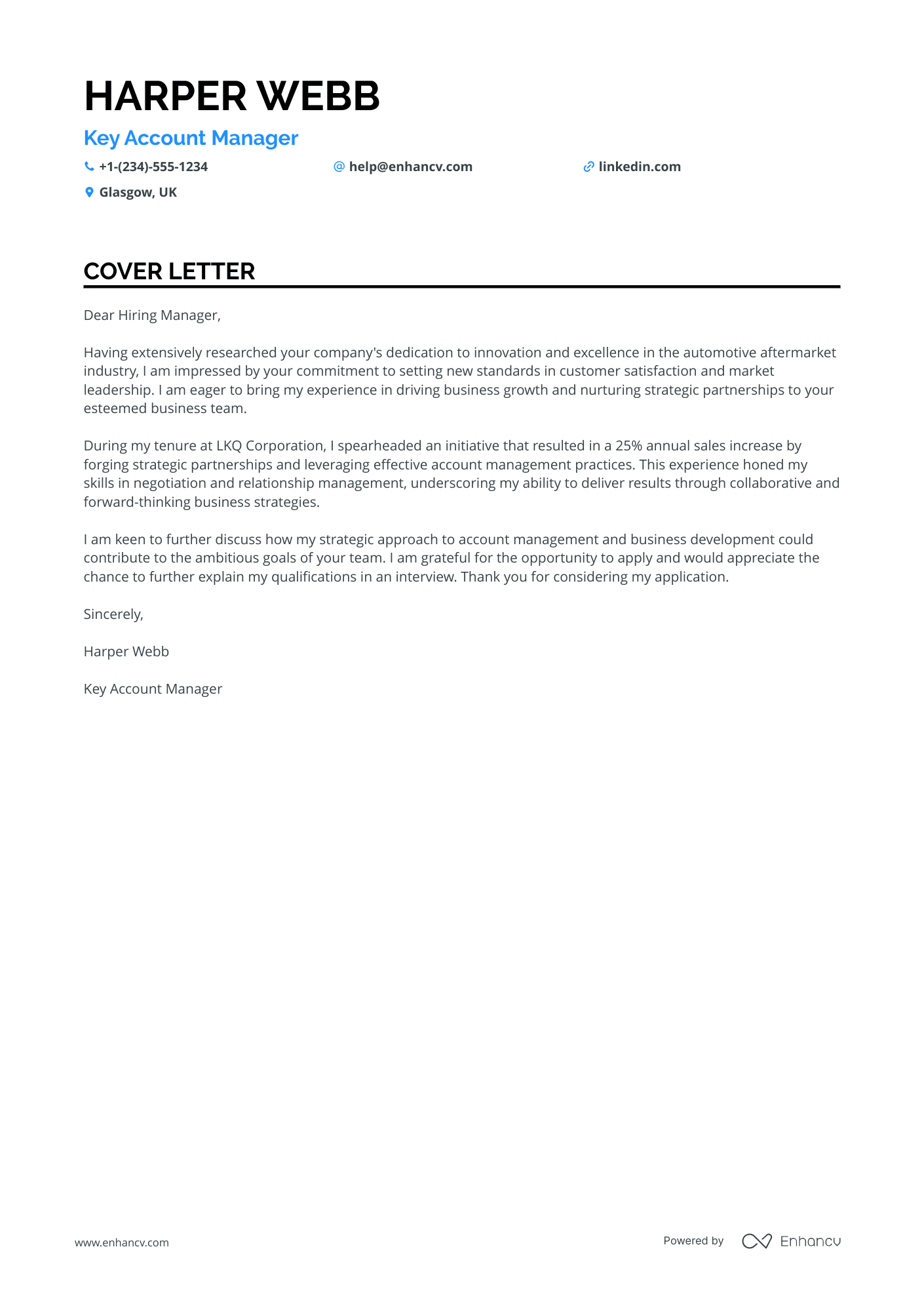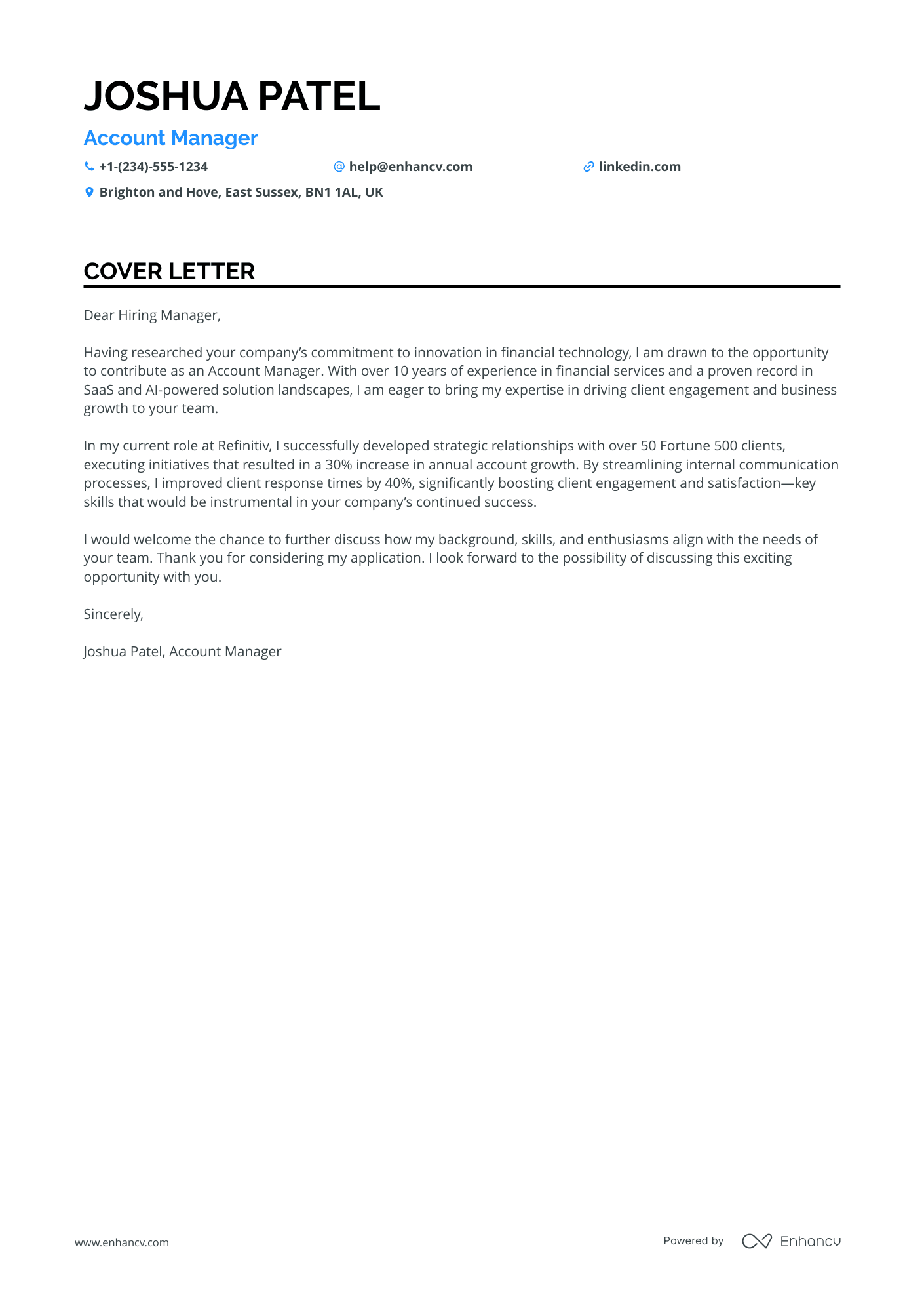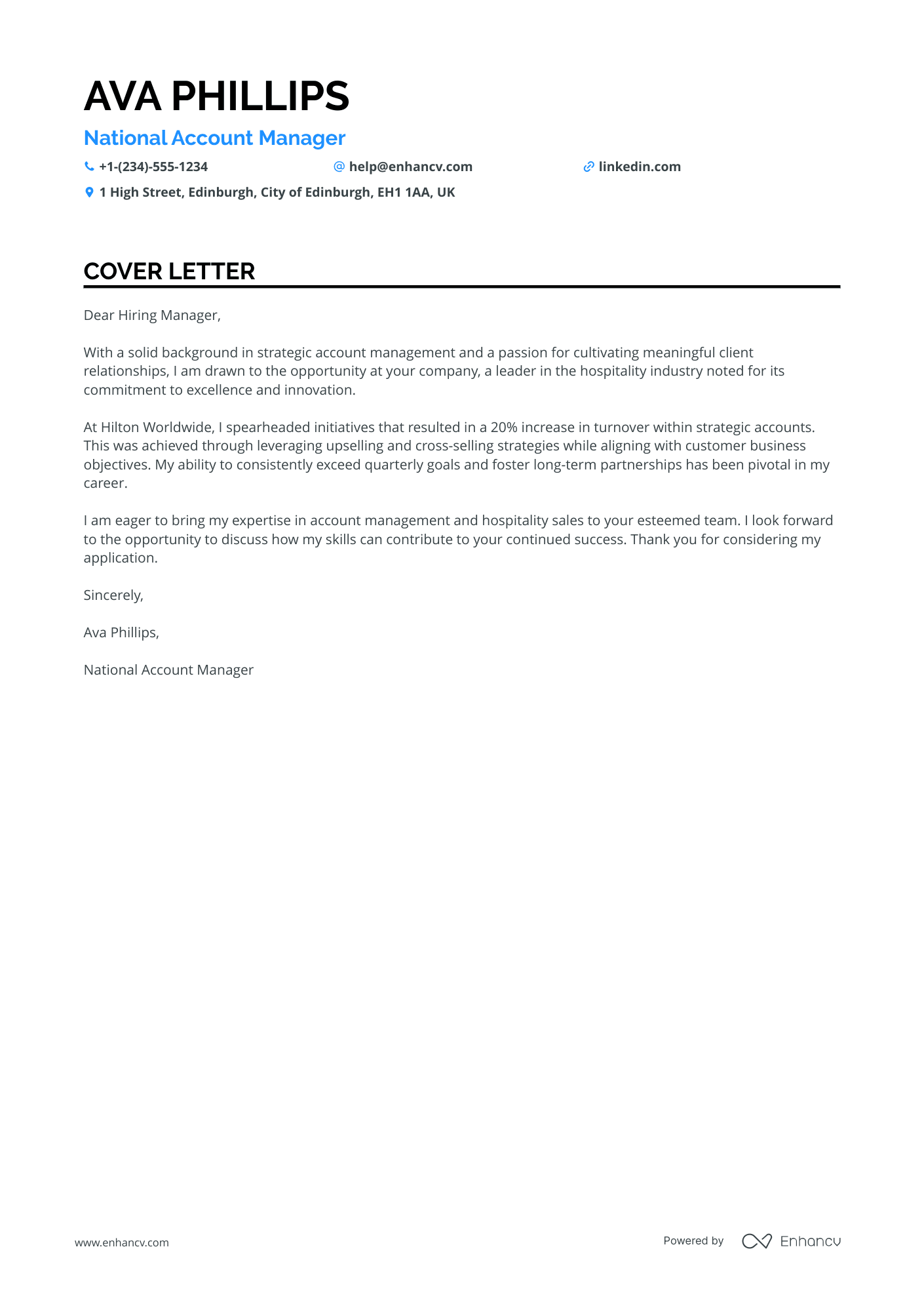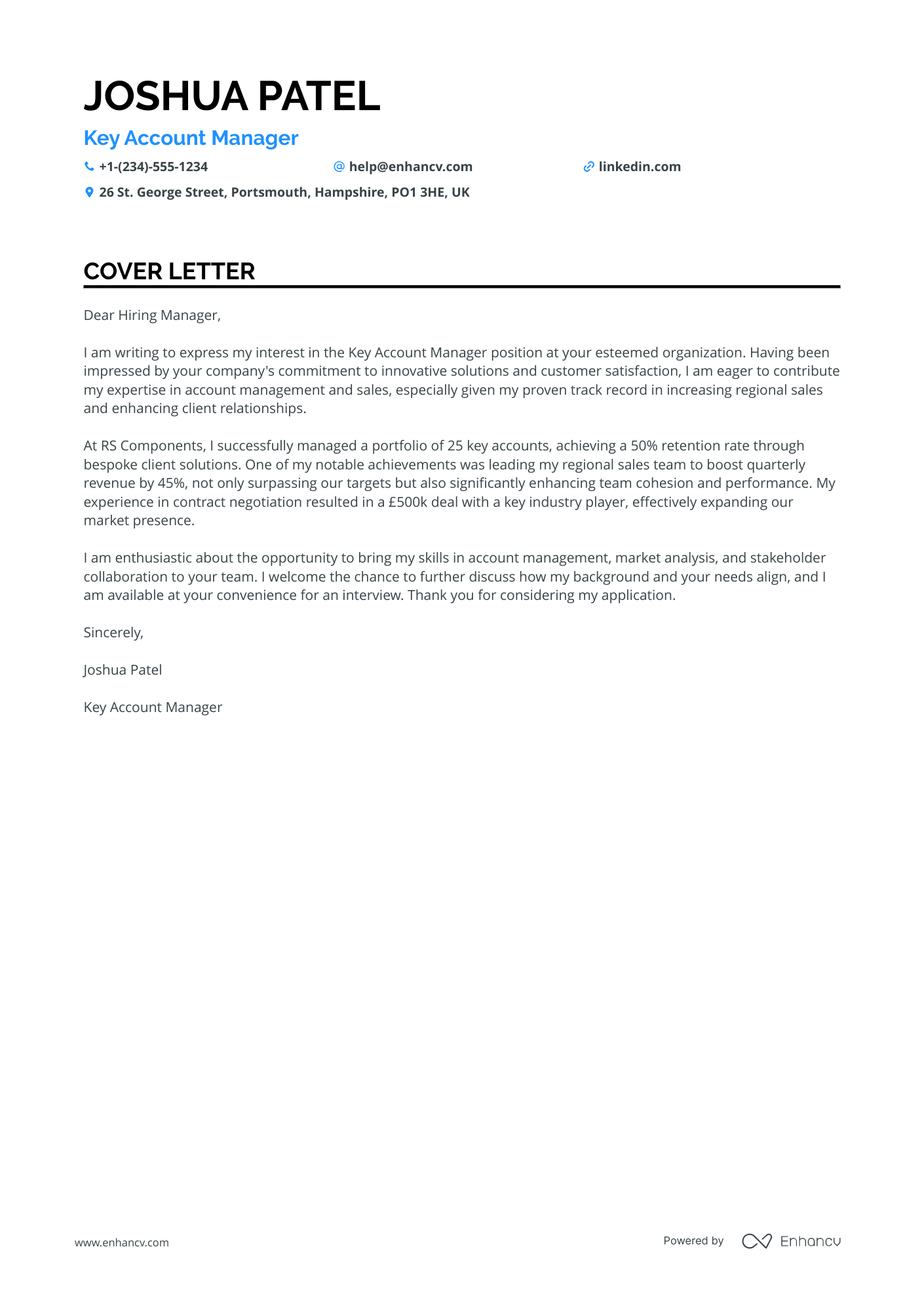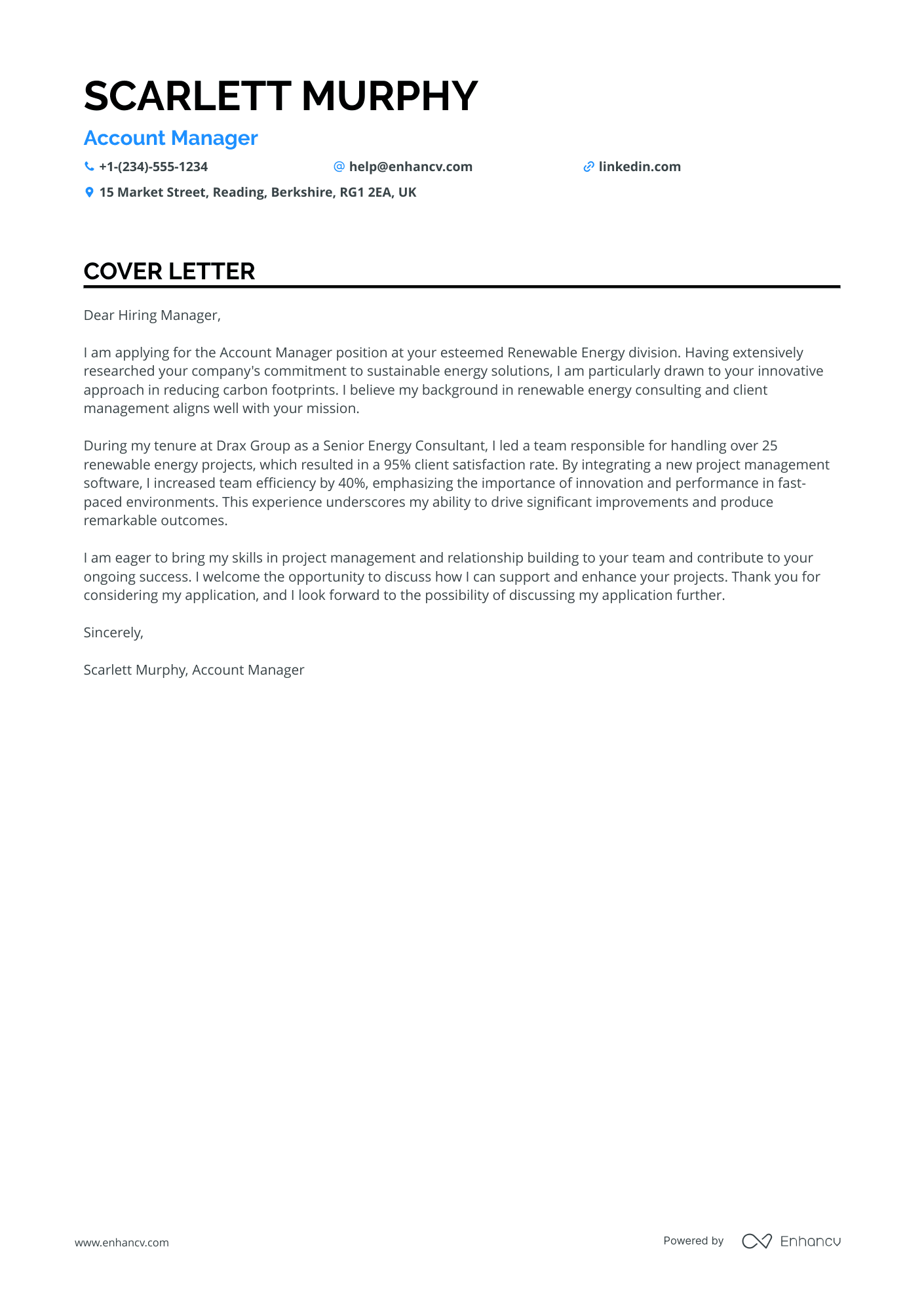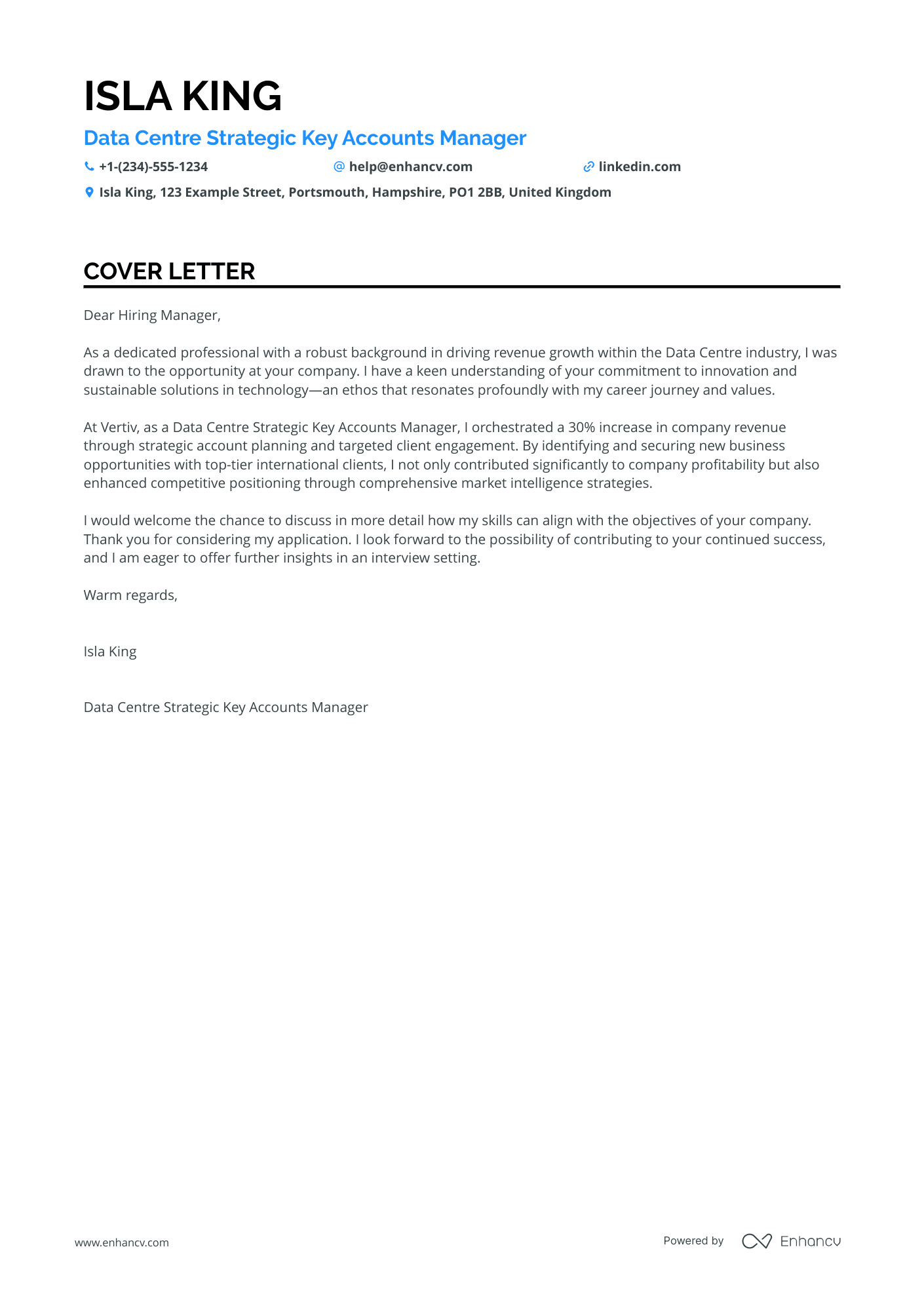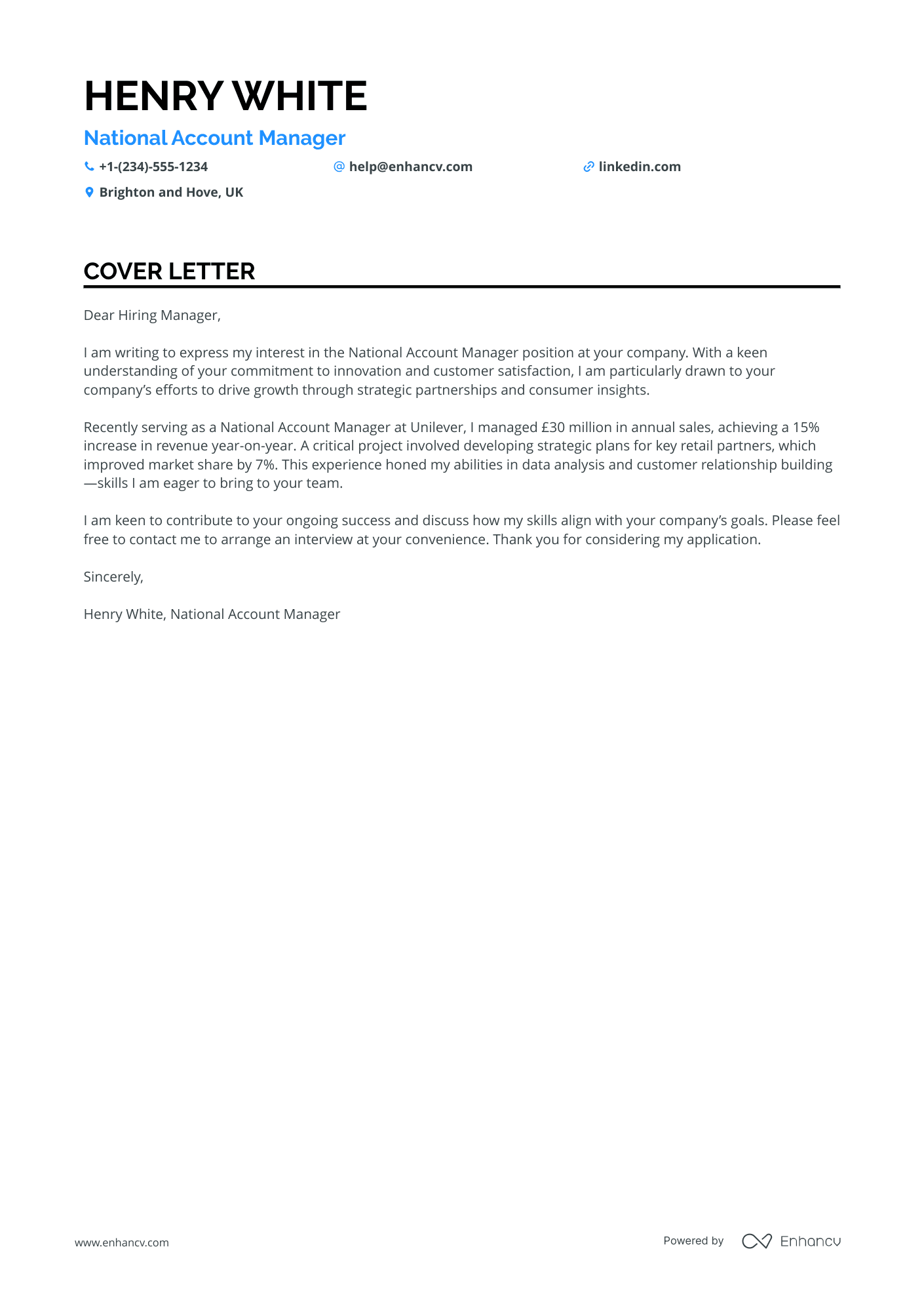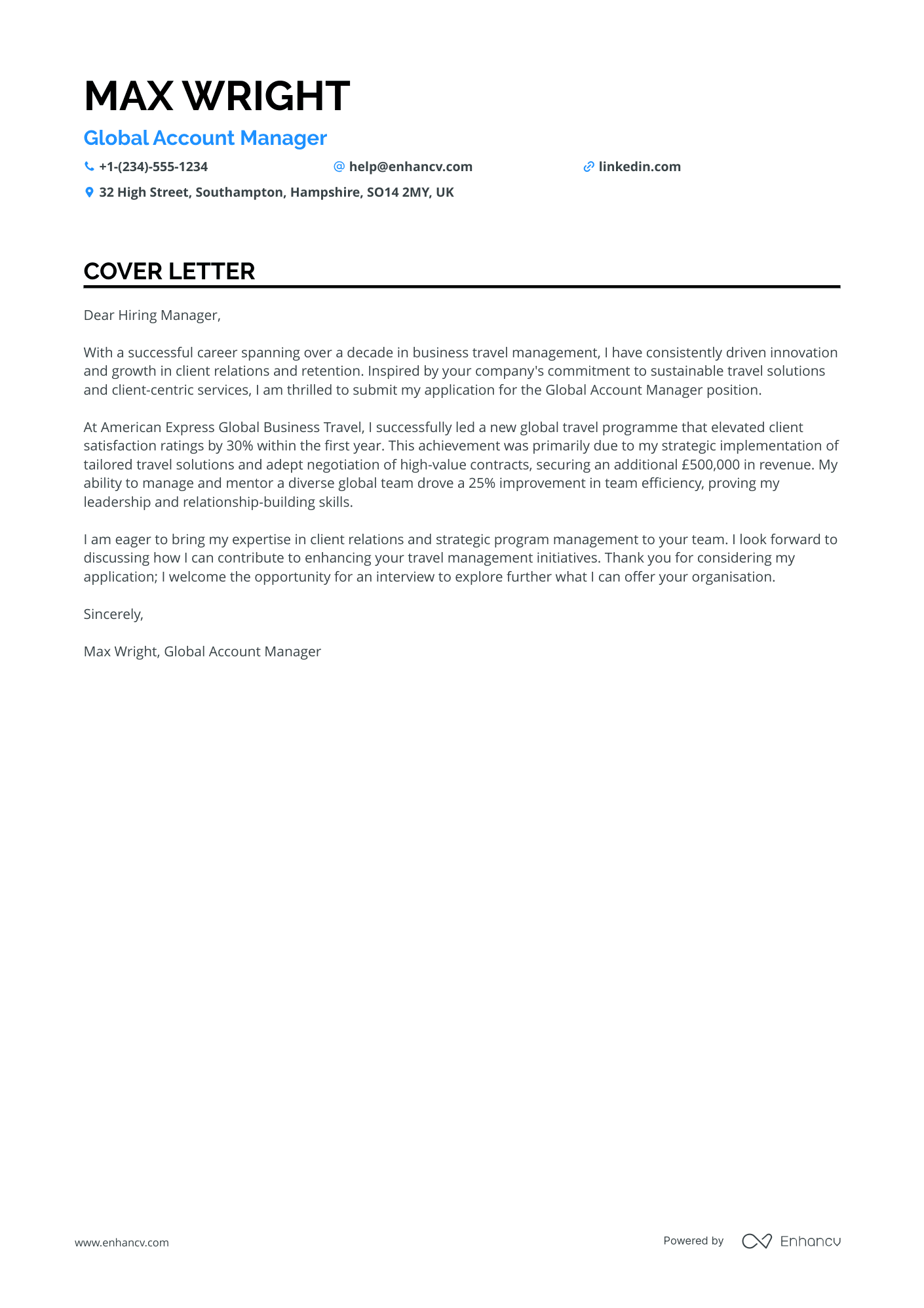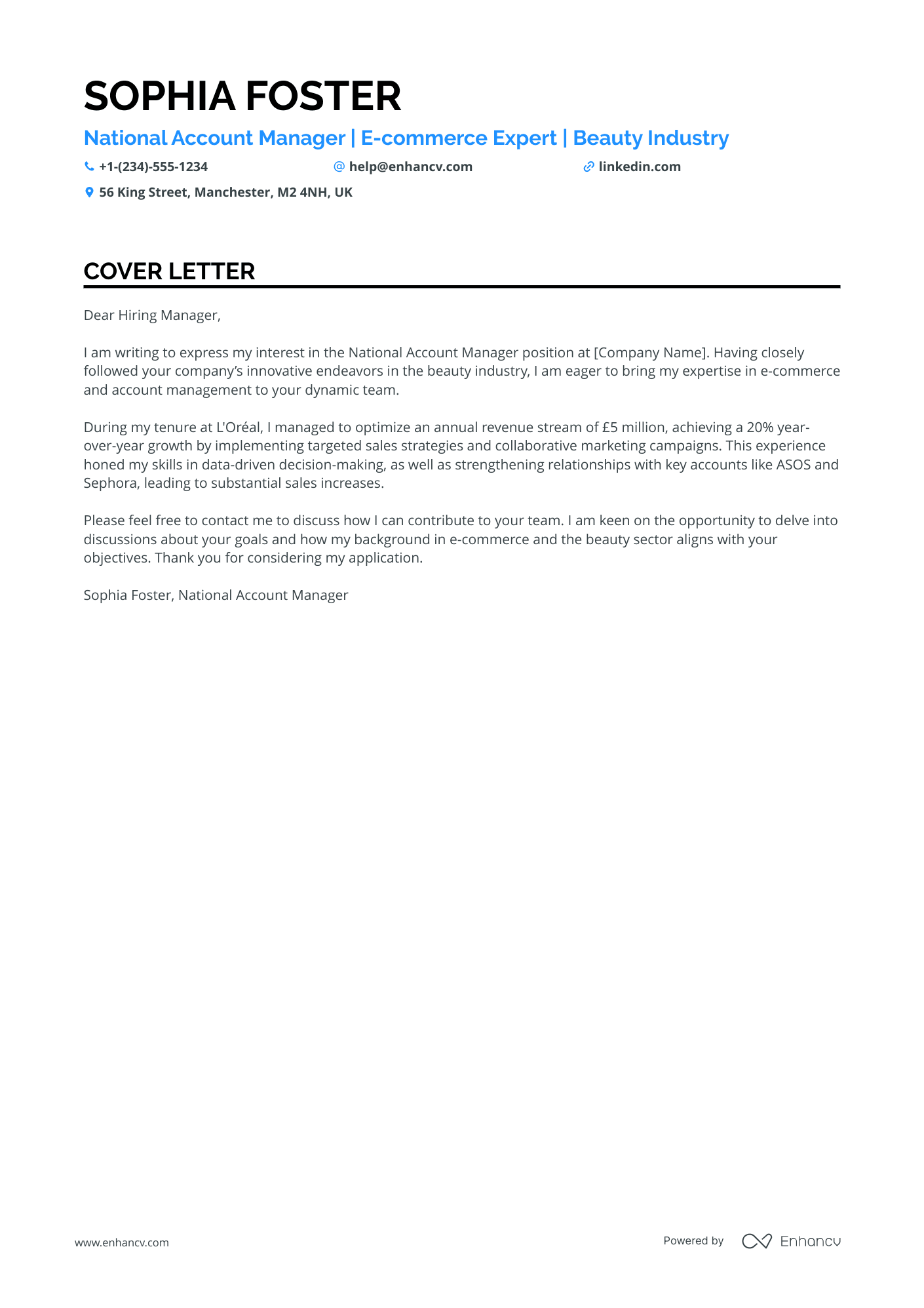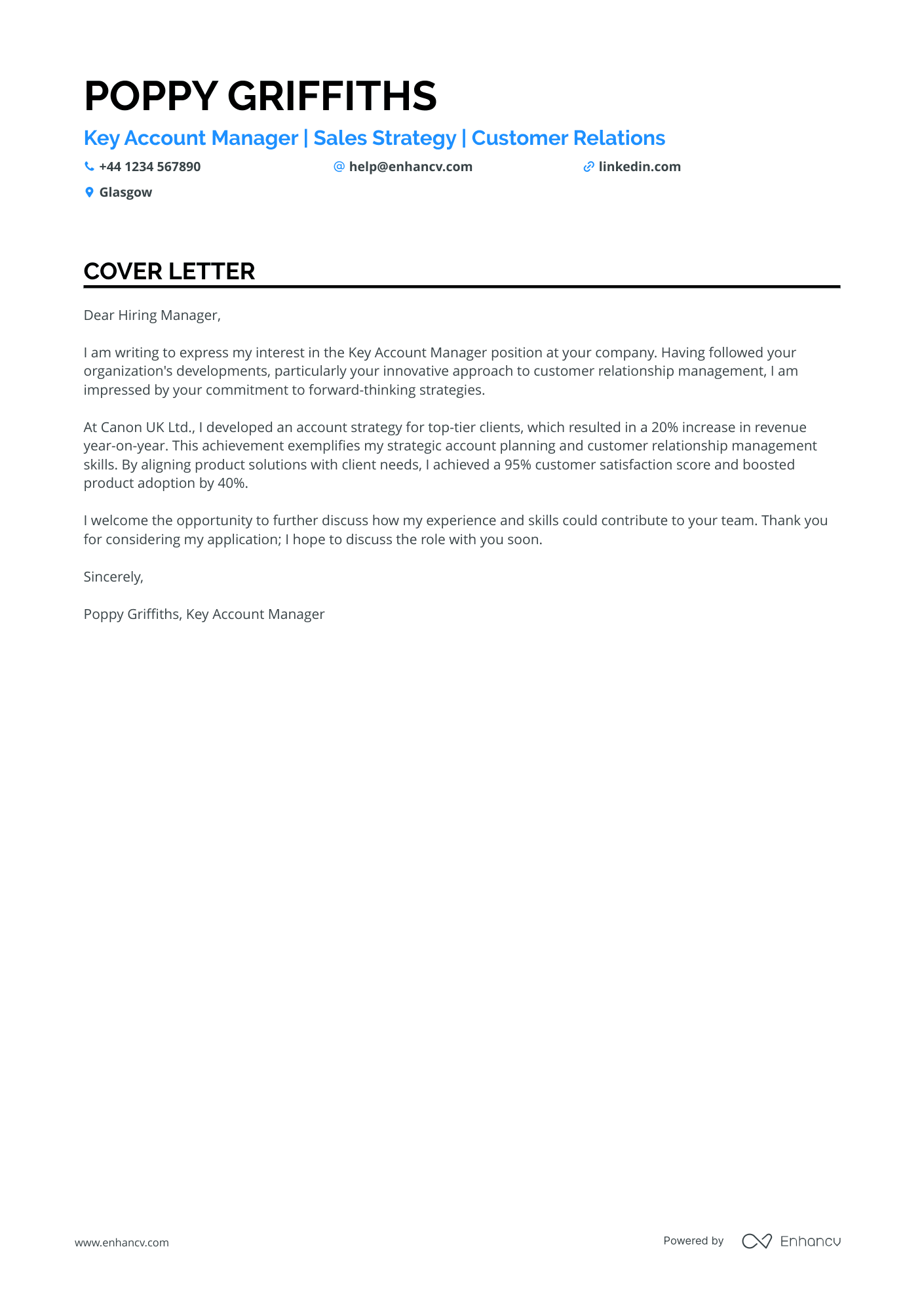You’ve just sent the same cover letter to 60 different job roles, all beginning with “Dear Sir or Madam” and ending with 'Yours sincerely.'
Bad news: you may have just missed your chance to stand out, as generic cover letters are a very common pitfall in job applications.
Did you know recruiters typically shortlist candidates based on how well they meet the job criteria? Failing to address the key requirements can cost you the role.
In this guide, we’ll show you how to tailor your cover letter to align with the job advert or company, ensuring you showcase your value as a candidate.
Cover letter examples for key account manager
By Experience
Senior Key Account Manager
- Highlighting Leadership and Team Management Experience: Emphasising roles where you have led teams, such as managing 10 account managers at Nike UK, showcases your ability to handle leadership responsibilities effectively.
- Showcasing Specific Achievements: Including quantifiable outcomes, like achieving a 30% increase in annual net sales or improving customer retention rates by 20%, strengthens your application by demonstrating real impact.
- Strategic Planning and Market Analysis Skills: These are critical for a Key Account Manager role. Illustrating these skills with examples, like developing competitive sales strategies and strategic account plans for top-tier clients, adds depth to your qualifications.
- Emphasising Educational and Professional Development: Listing relevant educational qualifications, such as an MBA, alongside specialised courses in sales management and data analytics, highlights your commitment to professional growth and equips you for strategic decision-making.
Junior Key Account Manager
- Highlighting Relevant Experience: Max effectively showcases his experience in the energy market sector, aligning with the role's industry focus. Mentioning positions held at recognised companies, like National Grid and EDF Energy, enhances the credibility and relevance of his application.
- Showcasing Quantifiable Achievements: The cover letter effectively includes specific accomplishments such as a 30% increase in client retention and £500,000 in additional annual revenues, providing tangible evidence of Max's effectiveness in previous roles.
- Emphasising Skills and Certifications: Key skills such as Client Relationship Management, Project Management, and Data Analysis are highlighted, which are critical to a key account management role. His certification in Client Engagement and Relationship Management further supports the credibility of these skills.
- Integration of Personal Interests and Professional Goals: Max’s passion for Renewable Energy Technologies aligns with the job’s industry focus, while his interest in technology and innovation emphasises his commitment to staying ahead in the field.
Lead Key Account Manager
- Leadership Experience: The cover letter effectively highlights Isabella’s extensive experience in technical leadership, crucial for a Technical Lead role. Her history of leading engineering teams and managing cross-functional projects is emphasised, illustrating her capability to thrive in high-level management roles.
- Technical and Project Management Skills: Isabella’s skills in test engineering, data acquisition, and project management are clearly outlined, which are essential for the responsibilities involved in the role. These skills underscore her ability to manage complex technical projects efficiently.
- Achievements and Recognitions: The letter includes specific achievements, such as securing substantial contracts and achieving significant savings, which validate her competence and effectiveness in previous roles. This kind of quantifiable success is persuasive in a cover letter.
- Industry Certifications: Certifications like the Project Management Professional indicate her advanced mastery in project management, further highlighting her suitability for the role by underlining her commitment to professional development.
Assistant Key Account Manager
- Highlighting Experience and Achievements: The cover letter effectively outlines Theodore's extensive experience in client communications and procurement, complemented by specific achievements such as improving client satisfaction rates and enhancing profit margins.
- Emphasising Analytical Skills: It underscores proficiency in cost reduction and stakeholder management, reflective of skills crucial to the account specialist role, supported by continuous learning as demonstrated by courses like Advanced Excel for Business.
- Showcasing Industry-Specific Knowledge: The letter showcases Theodore's capability in strategic supplier engagement and procurement innovation, aligning with the role’s requirements to manage key accounts and enhance service delivery.
- Soft Skills and Cultural Fit: Attributes such as passion for procurement innovation, travel, and photography indicate a well-rounded personality, contributing to a dynamic and innovative approach towards client relationship management.
By Role
Key Account Manager in Retail
- Emphasising success in cost reduction and increased customer satisfaction, which are critical aspects in the supply chain and logistics domain.
- Highlighting roles that demonstrate a track record in stakeholder management and strategic growth, both essential for a New Business & Key Account Support Manager.
- Incorporating specific achievements, such as securing contracts and improving operational efficiency, showcasing the ability to drive business growth and manage key accounts effectively.
- Mentioning advanced educational qualifications in Supply Chain Management, which support the specialised nature of the role and demonstrate industry expertise.
Key Account Manager in Pharmaceuticals
- Highlighting Achievements: The cover letter effectively showcases specific achievements, such as a 20% increase in sales and a 90% client retention rate, emphasising the candidate's capability in driving results in pharmaceutical sales.
- Experience Detailing: Detailed accounts of past roles, including managing contracts and optimising sales processes, illustrate the candidate's extensive experience and suitability for the regional account manager position.
- Skills and Courses Alignment: Mention of relevant skills like stakeholder management and courses like the ones from London Business School and Harvard Business School Online, align with the requirements for strategic partnership and negotiation prowess in the pharmaceutical industry.
- Industry-Relevant Education: The educational background in pharmacy and business administration is directly relevant to the pharmaceutical sales role, demonstrating the candidate's technical know-how and business acumen.
Key Account Manager in Telecommunications
- Emphasise achievements in sales and client retention, such as a 15% increase in customer retention through CRM proficiency, which is crucial for an Account Manager role.
- Highlight leadership skills and experience, like developing a high-performing team and leading strategic account plans, to showcase capability in managing and growing client relationships.
- Showcase technical expertise in telecom engineering and project management, as demonstrated by successful coordination with cross-functional teams and delivering tailored solutions.
- Discuss continuous learning and professional development through relevant courses, such as Advanced Telecom Network Management, which highlight commitment to staying updated in the field.
Regional Key Account Manager
- Highlight strategic and technical expertise by emphasising the candidate's successful execution of market penetration strategies, capturing new segments within one year, and contributing to a consistent exceedance of revenue targets.
- Emphasise specific achievements, like the implementation of innovative customer partnerships and tailored service offerings that led to significant increases in regional sales and client retention.
- Showcase communication and relationship-building skills as demonstrated by negotiating complex sales contracts and leading cross-functional collaborations that improved project delivery times and market positioning.
- Mention relevant certifications, such as the "Advanced Negotiation Skills" from Coursera, which exhibits the ability to effectively negotiate with stakeholders, a valuable asset for any sales role.
National Key Account Manager
- Strategic Growth and Negotiation Expertise: The applicant effectively highlights their skills in strategic growth and negotiation, critical for a National Key Account Manager, showcasing a proven track record in driving profits and negotiating complex deals.
- Proven Sales and Customer Relationship Success: Demonstrating a £500k annual revenue increase and improved customer satisfaction scores by 20% exemplifies the ability to meet and exceed sales targets, a vital aspect for this role.
- Leadership and Team Management: By detailing experiences where they led regional teams and improved performance by 30%, the applicant underscores their leadership capabilities essential for national account management.
Key Account Manager in Manufacturing
- Highlight Relevant Experience: The cover letter effectively showcases over 10 years of experience in sales and account management, crucial for a Key Account Manager role focused on client relations and market strategy.
- Quantifiable Achievements: Utilising specific metrics such as increased client retention by 25% and revenue growth by 10% demonstrates the candidate’s ability to achieve tangible results, which is essential for competitive roles.
- Key Skills and Tools: Emphasising skills like Global Sales Strategy, Customer Relationship Management, and tools like Salesforce CRM, which are vital for enhancing client relationships and optimising sales processes.
- Educational Background and Professional Development: Presenting advanced education credentials (MBA from London Business School) and relevant courses (e.g., Advanced Negotiation Skills from Harvard) adds credibility and relevance for the role.
Key Account Manager in Logistics
- Highlighting Relevant Experience: The candidate provides a solid background as a Senior Account Manager with success in reducing shipping costs and enhancing operational efficiency, which are crucial points for a Key Account Manager role.
- Emphasising Skills and Results: The cover letter showcases valuable skills such as contract negotiation and logistics optimisation, coupled with specific accomplishments like increasing supplier satisfaction by 18% and attaining a 22% revenue growth, which demonstrate the ability to achieve substantial results.
- Relevant Certifications and Courses: The inclusion of advanced courses and certifications in supply chain analytics and logistics and transportation management underscores the candidate's commitment to ongoing professional development in areas essential to supplier relations and logistics management.
- Demonstrating Language Proficiency: Mentioning proficiency in French, in addition to English, adds an edge in positions that might involve global supplier relations and communication.
Key Account Manager in IT Services
- Emphasising a strong track record in increasing sales and acquiring new accounts highlights the applicant's ability to drive revenue growth in a competitive industry such as the automotive aftermarket.
- Showcasing collaboration with marketing teams for product launches emphasises the candidate's ability to work cross-functionally, which is essential for roles involving business development and stakeholder engagement.
- Focusing on awards and recognitions, such as the "Top Sales Performer 2020," illustrates the applicant's excellence and recognition in their field, solidifying their reputation as a high achiever.
- Highlighting specific skills like negotiation and market analysis demonstrates the candidate's capability to manage high-stakes client relationships and informed decision-making, essential for a Key Account Manager role.
Key Account Manager in Financial Services
- Highlighting Relevant Experience: The cover letter effectively showcases a decade-long experience in financial services, crucial for credibility in an Account Manager role within this sector.
- Emphasising Achievements and Impact: The letter quantifies achievements, such as a 30% increase in annual account growth, which underscores the candidate's capability to deliver tangible results.
- Showcasing Strategic Skills: It highlights strategic planning abilities, such as the launch of a new SaaS product resulting in a £3M revenue increase, aligning with the role's demands for strategic oversight.
- Mentioning Advanced Education and Continuous Learning: The mention of an MBA and specialised courses in AI and data analysis demonstrates the candidate's commitment to continuous learning and expertise development, benefiting a tech-driven financial sector role.
Key Account Manager in Hospitality
- Emphasising Achievements: The cover letter highlights key achievements such as a 20% growth in strategic accounts and numerous awards, showcasing measurable success in previous roles, essential for demonstrating value to potential employers.
- Strategic Skillset: Detailed accounts of strategic account management, contract negotiation, and CRM software usage align with the core requirements of a National Account Manager role within the hospitality sector.
- Industry-Specific Experience: Experience working with prominent hospitality companies like Hilton Worldwide and Marriott International is crucial, as it indicates familiarity with industry standards and expectations.
- Educational Background: Holding an MBA from the University of Edinburgh supports the candidate’s capability in managing national accounts through developed business acumen and strategic thinking.
Key Account Manager in Healthcare
- Emphasising key achievements, such as increasing regional sales by 45% and securing high-value contracts, showcases the candidate's proven track record in sales growth and business expansion.
- Highlighting the portfolio management experience, with a demonstrated 50% client retention rate, underlines the candidate's capability in maintaining long-term client relationships and ensuring customer satisfaction.
- Mentioning completion of advanced courses like the Advanced Sales Techniques and Client Relationship Management Certification illustrates the candidate's commitment to continuous learning and enhancing expertise in sales and client relations.
- Incorporating a summary that succinctly outlines over 8 years of experience, along with skills in stakeholder collaboration and goal-oriented account management, effectively targets the prospective employer's needs for supporting company growth.
Key Account Manager in Energy Sector
- Highlight Relevant Industry Experience: Mentioning 7 years of experience in client relationship management and technical delivery within the renewable energy sector immediately establishes credibility in the field.
- Showcase Leadership and Team Management Skills: Detailing the leadership role in managing over 25 renewable energy projects with a high client satisfaction rate demonstrates effective leadership capabilities which are crucial for an Account Manager position.
- Emphasise Technical and Strategic Expertise: Describing accomplishments such as increasing team efficiency and energy trading performance by significant percentages reflects a proactive approach and expertise in implementing strategic business solutions.
- Underscore Relevant Certifications: Including certifications such as Certified Energy Manager and Project Management Professional (PMP) can differentiate an applicant by highlighting ongoing professional development and mastery of essential skills required for managing complex energy projects.
Strategic Key Account Manager
- Highlighting Achievements: Clearly presenting specific achievements, such as a 30% revenue increase and a 20% reduction in turnaround time, demonstrates quantifiable success in sales and efficiency, which are critical for a Strategic Key Accounts Manager role.
- Emphasising Industry Expertise: Including relevant certifications like the Certified Data Centre Management Professional (CDCMP) elevates the applicant's expertise and suitability for a role focused on Data Centre Operations and management.
- Focusing on Client Engagement: Showcasing skills and experience in building and maintaining client relationships highlights essential competencies in account management and customer retention, vital for sustaining long-term business growth.
- Demonstrating Leadership and Collaboration: Highlighting experience in leading cross-functional teams and collaborating internally demonstrates the ability to lead initiatives that align with strategic business goals, crucial for a senior managerial position.
Key Account Manager in Consumer Goods
- Highlight Specific Achievements: The cover letter effectively showcases Henry's specific achievements, such as leading a 15% revenue increase and achieving a 20% growth in sales, which are particularly relevant for an Account Manager role.
- Emphasise Relevant Skills: It emphasises key skills crucial for sales roles, such as Customer Relationship Building and Strategic Planning, showcasing Henry's ability to develop personalised plans and enhance client satisfaction scores by 25%.
- Incorporate Professional Development: It includes relevant certifications from reputable institutions like the Chartered Institute of Marketing, underlining Henry's commitment to continuous professional development in Sales Management and Data-Driven Marketing.
- Demonstrate Leadership and Mentoring: The cover letter highlights Henry's leadership role in mentoring and coaching junior team members, which is valuable for a management position that requires team development and leadership.
Global Key Account Manager
- Tailored Summary: The summary succinctly highlights the candidate's extensive experience in business travel management and client retention, setting the stage for their suitability for roles requiring similar expertise.
- Quantifiable Achievements: Throughout the cover letter, the candidate uses specific metrics (e.g., increasing client satisfaction by 30%) to showcase the tangible impact of their work, which is crucial in making an impression in sales and management roles.
- Relevant Skills and Courses: The inclusion of a specific course in Advanced Contract Negotiation aligns with the role of Account Management, emphasising continuous professional development in contract-related skills.
- Languages: Listing proficiency in both English and Spanish is valuable in global roles that require communication across diverse regions, enhancing the candidate’s ability to manage international client relations effectively.
Key Account Manager in E-commerce
- Emphasising expertise in e-commerce and data analysis by demonstrating a significant sales increase (e.g., £3M) can underline the candidate’s potential to drive revenue growth.
- Highlighting specific achievements such as managing and optimising revenue streams and exceeding annual sales targets showcases the candidate's ability to deliver results.
- Including key partnerships with well-known brands like ASOS and Sephora can affirm the candidate’s success in strengthening professional relationships and boosting sales.
- Mentioning continuous learning through relevant courses, such as "Advanced E-commerce Strategies" and "SEO for Digital Marketing," could demonstrate commitment to staying updated with industry practices and skills.
Key Account Manager cover letter example
Poppy Griffiths
Glasgow
+44 1234 567890
help@enhancv.com
- Highlight Relevant Experience: Emphasize your previous experience in account management, showcasing specific achievements, such as developing account strategies that resulted in significant revenue growth.
- Demonstrate Industry Knowledge: Reference the company's approach to customer relationship management to show awareness of industry trends and your ability to adapt to innovative strategies.
- Emphasize Quantifiable Successes: Provide measurable outcomes, like a 95% customer satisfaction score or a 40% boost in product adoption, to underline the impact of your contributions.
- Align Your Goals with the Company: Express your enthusiasm for the potential role and indicate how your skills can benefit the company, showing an alignment of personal career goals with organizational objectives.
Importance of cover letters in the United Kingdom
A well-crafted cover letter can significantly strengthen your job application by emphasising why you’re an ideal fit.
Here are some reasons why it matters:
- Personalisation: Employers expect your cover letter to demonstrate how your skills and experience align with the company’s needs and/or values.
- Addresses what is omitted from your CV: If your career path includes gaps or changes, your cover letter is the best place to address these positively and explain their relevance.
- Opportunity to stand out: Many applicants have similar qualifications, so a tailored cover letter can show your unique attributes and experience.
What UK employers expect from a cover letter
A great cover letter can set you apart when applying for jobs in the UK.
Follow these tips to ensure you make a strong impression:
- Research thoroughly: Spend time delving into the company’s website, social media, and industry news to understand their projects, awards, and future plans. The more specific your knowledge, the better you’ll be able to demonstrate your suitability for the role.
- Reflect their values: Every UK company has its own set of values that guides their culture. Once you’ve identified them, make sure your cover letter reflects how your values and work ethic align with theirs. If they’re known for integrity, emphasise your commitment to ethical practices.
- Tailor your skills: Focus on aligning your most relevant skills with the job description. Look for key terms and priorities mentioned in the advert, and make sure to provide examples of how you excel in those areas.
How to format a key account manager cover letter
To get your cover letter's formatting right:
- Use a modern font like Lato, Raleway, or Chivo, rather than the overused Arial or Times New Roman.
- Set your cover letter to be single-spaced with 1-inch (2.5 cm) margins on all sides—our templates are automatically set up for you.
- Ensure both your CV and cover letter are consistent in font style and formatting.
- Always send your cover letter as a PDF to prevent alterations and preserve its layout.
When it comes to structuring your cover letter, follow this sequence: begin with your address and contact details, then the employer's details (i.e. name and address), and the date. Next, start with a personalised greeting, followed by your introductory, body, and closing paragraphs. Be sure to include a sign-off and your signature at the end.
Remember, although Applicant Tracking Systems (ATS) software, which may scan your CV for keywords, won't read your cover letter, it will be reviewed by recruiters.
How to write your key account manager cover letter salutation
First impressions often start with the greeting and in the case of your job application, 'Dear Sir or Madam' simply won't suffice.
Find out who’s hiring for the role—by calling or emailing the company, searching online, or using LinkedIn—and address them correctly.
Generally, you should address them by their surname (e.g., 'Dear Mrs Weasley'), but if you've spoken to them before, you might use their first name (e.g., 'Dear Albus').
How to write your key account manager cover letter intro
It's never a bad time to show enthusiasm about the role, company, or team in your cover letter introduction.
Begin by sharing one or two aspects that genuinely excite you about the position—whether it's the company culture, specific responsibilities, or the team's past achievements.
Your enthusiasm demonstrates that you'll bring a strong work ethic, are eager to contribute, and are motivated to succeed.
How to write your key account manager cover letter body
Your cover letter body is the most spacious and vital part of this document—it highlights your true value and the impact you can bring as a candidate.
Remember, your cover letter serves a different purpose to your CV. Here, you need to show your skills in context by telling the story of one significant achievement, hinting at how you’ll help your future employer achieve their goals.
So, when writing your cover letter body:
- Use concrete achievements to demonstrate your personality and impact.
- Support your achievements with quantifiable data and metrics.
- Tell the story of a successful project you’ve worked on and explain how you contributed to the outcome.
- Highlight both hard and soft skills to make your story more engaging.
- Focus on skills that are most relevant to the role and align with the company’s needs.
How to write a closing paragraph
You’ve written a brilliant cover letter so far—so don’t undermine it at the very end.
If you think signing off with a polite 'Kind regards' or 'I look forward to hearing from you' will make a strong impression, think again.
A better approach is to make a tangible promise—one that reflects both personal and professional growth—and demonstrates your value to the recruiters.
Alternatively, encourage the hiring managers by asking when you might expect to hear back from them.
Conclusion
Crafting an engaging cover letter can significantly enhance the effectiveness of your job application. Always personalise your letter by addressing the hiring manager directly and linking your qualifications to the role's requirements.
Highlight relevant achievements that set you apart and demonstrate your enthusiasm for the company. Maintain a professional format that complements your CV, creating a cohesive and polished application.
